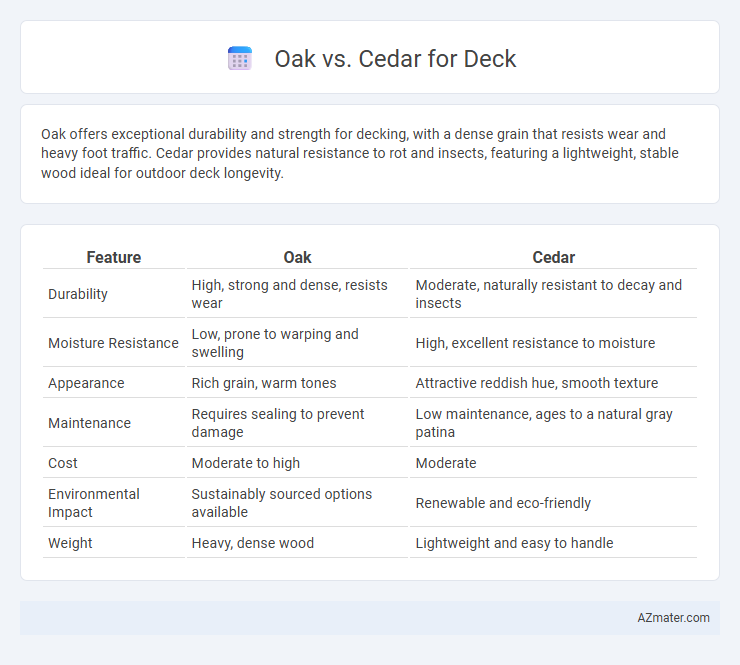Oak offers exceptional durability and strength for decking, with a dense grain that resists wear and heavy foot traffic. Cedar provides natural resistance to rot and insects, featuring a lightweight, stable wood ideal for outdoor deck longevity.
Table of Comparison
| Feature | Oak | Cedar |
|---|---|---|
| Durability | High, strong and dense, resists wear | Moderate, naturally resistant to decay and insects |
| Moisture Resistance | Low, prone to warping and swelling | High, excellent resistance to moisture |
| Appearance | Rich grain, warm tones | Attractive reddish hue, smooth texture |
| Maintenance | Requires sealing to prevent damage | Low maintenance, ages to a natural gray patina |
| Cost | Moderate to high | Moderate |
| Environmental Impact | Sustainably sourced options available | Renewable and eco-friendly |
| Weight | Heavy, dense wood | Lightweight and easy to handle |
Introduction: Comparing Oak and Cedar for Decking
Oak offers exceptional hardness and durability, making it ideal for high-traffic decking areas, while cedar provides natural resistance to rot, decay, and insect damage due to its aromatic oils. Oak's dense grain structure ensures long-lasting strength, whereas cedar's lightweight and dimensional stability reduce warping and splitting over time. Choosing between oak and cedar for decking depends on balancing durability, maintenance, aesthetic preferences, and budget considerations.
Wood Characteristics: Oak vs Cedar
Oak offers exceptional strength and durability with a dense grain structure, making it highly resistant to wear and impact for long-lasting deck construction. Cedar is prized for its natural resistance to rot, decay, and insect damage due to its high tannin content, combined with a lightweight and stable composition that reduces warping. While oak displays a coarse texture and rich, warm tones suitable for robust outdoor use, cedar features a fine, even grain and aromatic qualities that enhance both aesthetics and longevity in decking.
Durability and Longevity
Oak offers exceptional durability with its dense hardwood fibers, making it resistant to wear, dents, and weathering, ideal for high-traffic decks requiring long-lasting strength. Cedar boasts natural oils and resin that provide resistance to rot, insects, and decay, ensuring longevity even in moist or harsh outdoor environments. Both woods provide robust options, but oak's hardness supports greater structural integrity, while cedar's natural preservatives contribute to extended lifespan without chemical treatments.
Resistance to Weather and Pests
Oak exhibits strong resistance to weathering due to its dense grain structure, making it highly durable against moisture and temperature fluctuations; however, it is more susceptible to insect infestations without proper treatment. Cedar naturally repels pests such as termites and decay fungi because of its oils, offering superior protection against weather-related damage and insect attacks. For long-lasting decks, cedar provides enhanced resistance to both weather elements and pests, while oak requires sealing and maintenance to achieve comparable durability.
Maintenance Requirements
Oak decks require regular sealing and staining to prevent moisture damage and maintain their durability. Cedar naturally resists rot, decay, and insect infestations, reducing the frequency of maintenance and eliminating the need for chemical treatments. Both woods benefit from annual inspections, but cedar's natural oils make it a lower-maintenance option for deck owners.
Aesthetic Appeal: Color, Grain, and Aging
Oak offers a warm, rich color palette ranging from light amber to deep brown with prominent, coarse grain patterns that create a classic, robust aesthetic for decks. Cedar features a reddish-brown hue with fine, straight grain, providing a smoother, more refined appearance that naturally resists weathering and fades to a soft silver-gray over time. Both woods develop unique patinas as they age, with oak darkening to a richer tone and cedar maintaining its texture and evolving into a charming, rustic look.
Cost Comparison: Initial and Long-Term
Oak decks generally have a higher initial cost due to the wood's density and labor required for installation, while cedar offers a more affordable upfront price thanks to its lighter weight and ease of handling. Over the long term, cedar tends to incur higher maintenance expenses because it requires regular sealing and treatment to resist rot and insect damage, whereas oak's natural hardness and durability lead to lower upkeep costs. Evaluating total cost of ownership, oak may represent a better investment despite the steeper initial price, especially where longevity and minimal maintenance are priorities.
Environmental Considerations
Oak decks provide durable hardwood with moderate environmental impact due to slower growth rates and responsible forestry practices, ensuring sustainable sourcing. Cedar offers natural resistance to decay and insects, often grown in managed forests with faster growth cycles, making it a renewable choice with lower chemical treatment requirements. Choosing between oak and cedar for decking balances durability with ecological footprint, where certified wood sources and local harvesting reduce environmental impact.
Installation and Workability
Oak's dense grain makes it challenging to cut and requires pre-drilling for screws, increasing installation time and effort. Cedar's softer texture allows for easier sawing, nailing, and shaping, enabling quicker and more precise assembly. The workability of cedar reduces labor costs and the potential for material damage during deck construction.
Final Verdict: Which is Better for Your Deck?
Oak offers exceptional durability and strength, making it ideal for heavy-traffic decks, while cedar provides natural resistance to decay and insects with a lighter touch and aesthetic appeal. Cedar is easier to work with and requires less maintenance, retaining its beauty without frequent sealing, whereas oak demands regular treatment to prevent weathering and maintain longevity. Choose oak for a robust, long-lasting deck in harsh conditions; select cedar for a charming, low-maintenance option with natural protection.

Infographic: Oak vs Cedar for Deck
 azmater.com
azmater.com